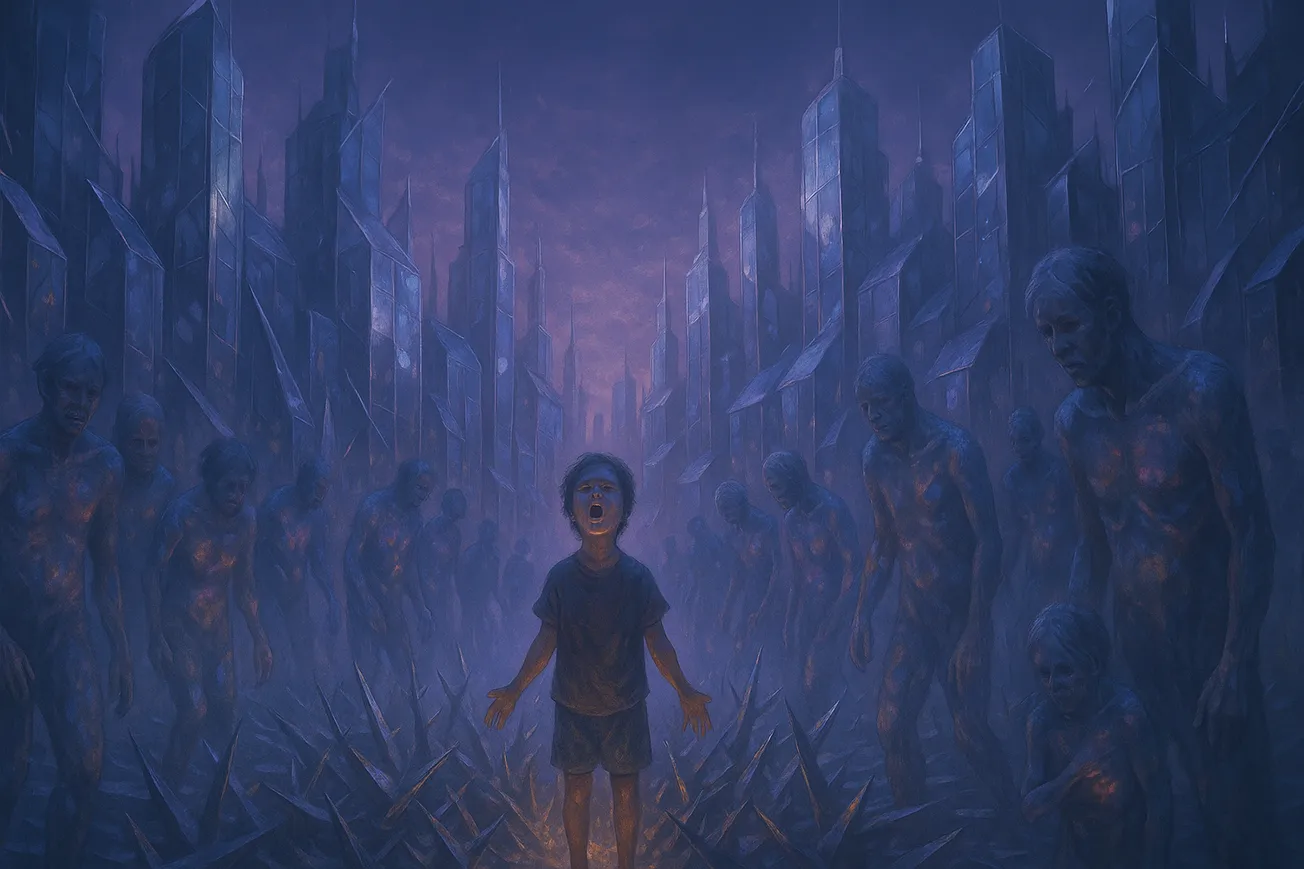🌈 The Fractal Story Engine | Body & Death | (12) BD-001-F1
There was once a city where no one spoke above a whisper. Even children were born with quiet bones, their laughter coiled and buried like roots in winter. The streets were tiled in reflective glass, and each building was sheathed in panels that shimmered like shallow water. The citizens had long since agreed to avoid direct touch, for to brush another’s skin was to risk transfer. Not of ideas or intimacy, but of pain.
It began three hundred years before, when a blind sculptor in the North Quarter discovered she could lessen her agony by pressing her palm against her husband’s chest. His heartbeat stuttered. Her back straightened. When she stood, he crumpled, eyes wide with inherited hurt. They called it communion at first. A gift. An intimacy of the sacred kind.
Then the trades began.
A miner with a shattered ankle offered five nights of pain to a hungry apothecary. A courtesan wore the burn of another’s grief for a festival moon. Mothers lined up in the eastern plaza, offering wrist-pricks of sorrow in exchange for coin. And over time, the city forgot that pain had once belonged only to the one who felt it.
In this city lived a child named Iver. They were neither rich nor poor, known only for their voice, an uncanny thing, clear and bright as rain. That alone made others wary. Children trained to curl their words like fog could not understand why Iver sang so freely, as if unafraid to shatter the air. Rumor swirled: they must be immune to pain. Or worse, a thief of it.
Iver’s mother worked in the Archives, a place where ledger after ledger recorded every pain transfer ever bartered. She told Iver that nothing ever truly disappeared. That pain, like water, only changed vessels.
One evening, Iver wandered to the glass garden, a forbidden stretch of land where mirrored thorns grew in twisting, impossible shapes. There, beneath the glinting moon, they met a woman cloaked in black feathers. Her face was not beautiful. It was cracked like clay in a kiln. But her eyes were steady, and her voice was the first Iver had ever heard that rose without trembling.
"You carry too much," she said.
"I carry nothing," Iver replied.
"Exactly."
She opened her arms. Iver stepped forward. They embraced.
No pain passed between them.
Instead, the mirrors began to hum.
Across the city, people doubled over, not from fresh wounds, but from echoes. Pain they had long forgotten surged back: the stubbed toe they sold for a fruit cart, the birthing ache given up for coin, the final breath of a sibling borne by a stranger. The streets rippled with memory.
The mayor’s gown ignited in invisible flame. She had once accepted a widow’s mourning for a banquet speech. A butcher dropped his cleaver, overcome by the weight of a lung once pierced by a miner’s collapse. The glass buildings cracked.
At the center of it all, Iver stood humming. Not a melody of joy. Not sorrow, either. Something older, stitched from notes no longer in fashion. Their song did not erase the pain. It gave it a place to live.
When the sun rose, the citizens found that their reflections had changed. The mirrors still showed their faces, but now also bore traces of others, the laugh lines of strangers, the bruises of those never met, the tears of trades unspoken. It was no longer possible to pretend the pain was not shared.
Years later, when Iver had vanished into the mirror-hum of legend, the city still hummed. People learned to speak again, not to bargain, but to confess. A new plaza was built, ringed in quiet stone. No pain was transferred there. Only witnessed.
And that, somehow, was heavier.

